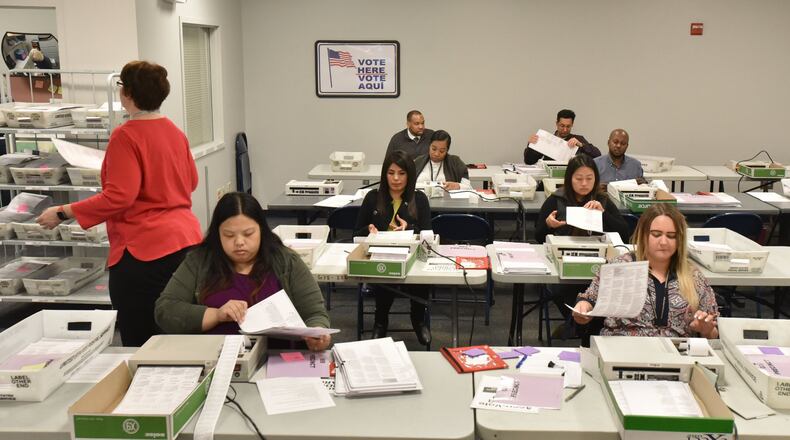It’s been only a few days since Gwinnett officially closed the book on the Nov. 6 general election, a process that started and ended with the county squarely at the center of Georgia’s larger debate over voter rights and ballot access.
Nonetheless, early voting for the Dec. 4 runoff started Monday in Gwinnett and elsewhere. A steady stream of voters filed in and out of the county elections office in Lawrenceville throughout the blustery morning, drawn by the races to replace Gov.-elect Brian Kemp as secretary of state and another contest for a spot on the state's Public Service Commission.
Their reasons for voting early — and their faith in Gwinnett’s elections process — varied.
“If you know the process, if you follow the rules, if you come and cast your vote like you should, I think you’re alright,” said 82-year-old Snellville resident Doyle McDaniel.
Abby Barr, a 55-year-old Loganville resident, was less optimistic. She said she wanted to vote early and in person to “make sure that my vote does count.”
“I do believe there was some voter suppression going on” in the general election, Barr said.
Gwinnett, a longtime Republican stronghold that's made a dramatic turn toward Democratic candidates in recent elections, found itself in an unflattering spotlight in mid-October. Media reports highlighted the county's disproportionately high rate of rejected mail-in absentee ballots. Gwinnett quickly became the target of multiple lawsuits and court orders, as well as the inspiration for additional guidance issued by the Secretary of State's office, which oversees elections.
The county drew more attention on Election Day, when technical and human errors caused long lines at voting precincts in areas of the county with large black populations. And last week, representatives from the camp of Democrat Carolyn Bourdeaux — who lost her race for Georgia's 7th Congressional District by only a few hundred votes — questioned the county's procedures during a recount.
County officials have repeatedly denied any wrongdoing, saying they have merely followed the law as they understand it.
“As always, Gwinnett County will run elections in accordance with the law and that includes any direction we receive from the courts,” county spokesman Joe Sorenson said Monday afternoon.
Court orders issued by multiple federal judges during the Nov. 6 election mandated that Gwinnett and every other county across the state count some of the absentee and provisional ballots that might’ve otherwise been discarded.
The Secretary of State’s Office on Wednesday reminded local elections offices that those guidelines still stand for the runoff election. They include counting absentee ballots with signatures deemed to not match those on other government forms or missing or erroneous birth date information.
“It would definitely raise concerns from our perspective if elections officials decided to essentially go back to practices that were enjoined by the various courts in the lead up to the November election,” said John Powers, an attorney with the Lawyers’ Committee for Civil Rights Under Law, one of the groups that filed lawsuits against Gwinnett and the state. “… That would obviously create confusion and risk disenfranchising voters.”
Said Sean J. Young, legal director for the ACLU of Georgia: “If a court issues an order to a government agency, I expect that agency to comply with the order. And if they don’t, I move for a contempt of court.”
Advance in-person voting for the Dec. 4 runoff will be held from 7 a.m. to 7 p.m. every day through Friday. The only location is the Gwinnett elections office, located at 455 Grayson Highway in Lawrenceville.
Absentee ballots are also available and can be requested at gwinnettcounty.com or by calling 678-226-7210.
About the Author
Keep Reading
The Latest
Featured


